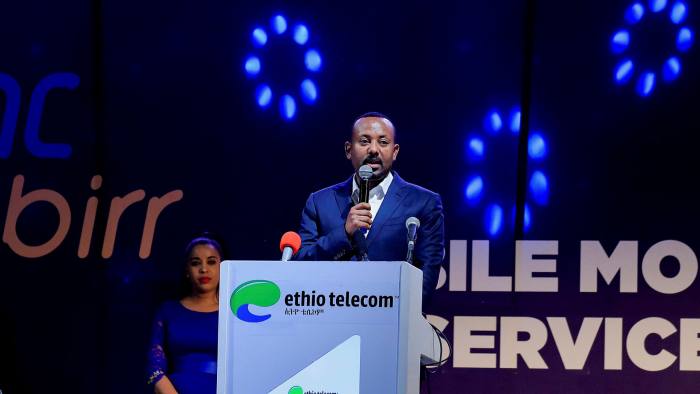- June 3, 2021
- Posted by: pragma_admin
- Category: Uncategorized

Ethiopia has awarded its first telecoms licence for $850m to a consortium including the UK’s Vodafone in what could herald the start of an opening up of Ethiopia’s closed economy.
The consortium, led by Kenya’s Safaricom with Vodafone and Vodacom, also includes British finance development agency CDC and Japan’s Sumitomo. A bid for a second licence from South Africa’s MTN for $600m was rejected as too low and the licence will be retendered.
The opening up of what is the world’s largest remaining telecoms monopoly in a fast-growing country of 114m people had been billed by the Ethiopian government as the “deal of the century”.
But potential bidders were put off by restrictions on offering lucrative mobile-money services and by government insistence that new operators build their own infrastructure or lease it from Ethio Telecom, the state monopoly, rather than using third-party tower operators.
Some bidders were also believed to be wary of the unstable political situation after the federal army moved to oust the government in Tigray region last November.
Companies that had shown initial interest, including Orange of France and Etisalat of the United Arab Emirates, are expected to take a second look when the licence is retendered, according to telecoms analysts.
Since the initial bid was closed, the government has softened its opposition to mobile money, saying new operators will be able to offer such services within a year, subject to central bank approval.
Abiy Ahmed, the prime minister, said in a tweet on Saturday that the Safaricom-led consortium represented the biggest foreign direct investment in the country’s history. Ethiopia has grown at near-double digits for much of the past 20 years based on an Asian-inspired state-led development model that prevented foreign capital from controlling “the commanding heights” of the economy such as banking and telecoms.
Abiy said that the new consortium would invest more than $8bn in building a network over the next decade. According to people involved in the tender process, that amount includes a “commitment” to invest $4.8bn, mainly in operational expenses, and $2.8bn, mainly on transmission lines.
But another person familiar with the bidding process countered that the investment numbers were prompted by a desire to present a good news story ahead of national elections scheduled for next month. “There’s no way on earth you’ll ever make money if you invest $8bn,” the person said.
Brook Taye, senior adviser to the finance ministry and part of the team overseeing the privatisation, said the successful consortium had also committed to launching a low-orbit satellite to cover the whole country by 2023. The new investment would create between 1.1m and 1.5m jobs, he said.
Safaricom employs about 6,500 people in Kenya, a country with a similar sized economy to that of Ethiopia, at about $95bn, and a population of 52m, just under half the size.
However, Safaricom’s sustainability report said that its services supported employment for more 1m people through its “wider economic impact”, a figure that takes into account entrepreneurs who are able to make a living thanks to the telecoms ecosystem.
Brook said the second licence would be retendered “very soon”, possibly with further adjustments to rules to make it more attractive. Potential bidders in the first round complained of shifting rules, including a lack of clarity over interconnection fees, which were cut shortly before bids were due in.
Brook denied that the tender had been opaque, saying “this is the most transparent process that ever happened in Ethiopia”. He said the sector would be opened up further “so we think there’ll be a very successful second bid”.
Ethiopia also plans to sell a 40 per cent stake in Ethio Telecom, which has 46m subscribers, later this year.
Source: Financial Time
